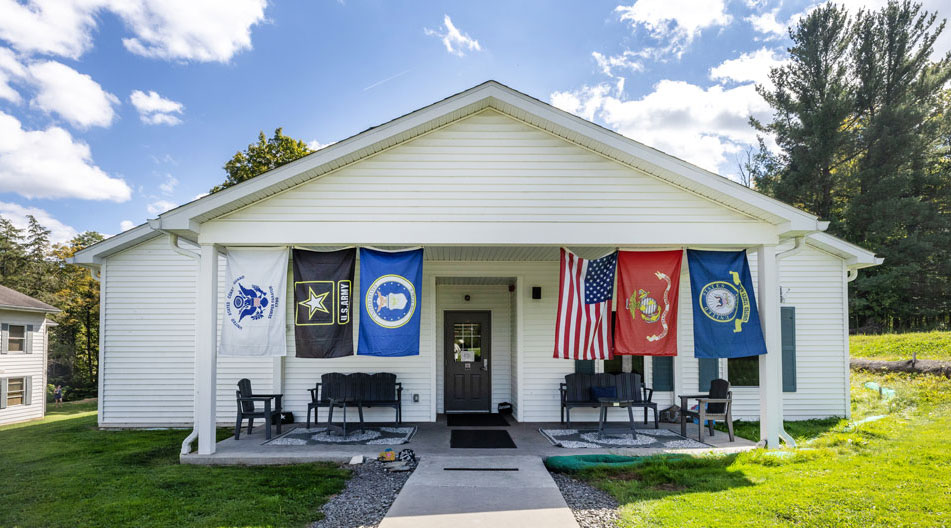Tactical Recovery

While no two people with substance use disorders are exactly alike, veterans with substance use disorders have unique needs compared to their civilian counterparts. Understanding these concerns is crucial to ensuring veterans get the care they need to begin a life of lasting sobriety.
Substance Use Disorders and PTSD
Trauma is well-recognized as a trigger for drug and alcohol abuse. For veterans, substance use disorders are often related to PTSD developed as a result of trauma related to their military service. According to the US Department of Veterans Affairs, 20% of veterans with PTSD also have a substance use disorder and 1/3 of veterans seeking addiction treatment also meet the criteria for a PTSD diagnosis.
For veterans with PTSD, drug and alcohol abuse often begins as a way to cope with symptoms such as:
- Feeling hopeless, numb, and detached
- Experiencing flashbacks of traumatic events
- Trouble sleeping due to nightmares
- Changing daily routines to avoid triggers such as sights, sounds, or smells related to traumatic events
- Worrying the world is dangerous and nobody can be trusted
While substance abuse typically masks the symptoms of PTSD, it creates additional problems in a veteran’s life. Over time, a tolerance develops, and the veteran is drinking or using more to achieve the same effect. The risk of self-harm increases due to impaired judgment, poor coordination, and decreased problem-solving skills. Relationships with loved ones become even more strained as the veteran withdraws from friends and family to spend more time under the influence.
Substance Use and Chronic Pain
Chronic pain related to combat injuries can easily lead to a problem with abusing painkillers. Percocet, OxyContin, Vicodin, and other opioid painkillers are extremely addictive when they are not taken exactly as prescribed. Further problems can result when a veteran mixes prescription painkillers with alcohol to increase their sedative effects—including a high potential for a fatal overdose.
Veterans with chronic pain need access to treatment that includes a wide range of drug-free pain relief options—including massage, physical therapy, meditation, biofeedback, and lifestyle changes. Without a plan for pain control, veterans can’t achieve the quality of life they deserve.
Female Veterans, Military Sexual Trauma, and Substance Use Disorders
Even though women are the fastest growing group of veterans, they can face additional challenges when it comes to getting treatment for a substance use disorder. This is often due to stigma and a lack of social support in the community, since the majority of veteran outreach programs are geared primarily to the needs of men.
Sexual trauma related to military service is an area of particular concern. Research shows one out of five female veterans reports being a victim of military sexual trauma. Experiencing sexual harassment, sexual assault, or rape can leave a woman feeling as though she’s constantly under attack. She may blame herself for what happened and be too ashamed or embarrassed to confide in her loved ones when she returns home. She may be using drugs and alcohol to deal with her emotions, but she may also suffer from an eating disorder developed as a coping mechanism.
How Veterans Can Get the Help They Need to Move Forward
Military culture often makes veterans reluctant to talk about their struggles, but substance use disorder is a progressive illness that will continue to cause problems until it has been addressed. It’s not caused by a lack of willpower or a character defect, nor is it anything to be ashamed of. It’s a biologically based illness with environmental triggers.
To start their recovery journey, veterans need access to evidence-based care that includes treatment for co-occurring disorders and is personalized to fit their unique needs. This typically involves individual and group therapy, as well as family therapy to help strengthen a veteran’s support system at home. Medication-assisted treatment may also be recommended in some cases, such as when a veteran is addicted to opioids.
While the VA does offer some substance abuse and mental health treatment options for veterans, accessing this care is not always convenient. Additionally, many veterans prefer to begin their recovery journey in a more home-like setting that is closer to their existing support system.
Bridge Care
When there isn’t current availability at a VA facility, but a veteran needs immediate help, our Bridge Care program can be the answer. With proper authorization, veterans can start receiving care at our Tactical Recovery program locations until services can be secured at a VA facility. This bridge can support veterans when they need help the most, and start them on the road to recovery sooner.
Offered at all Tactical Recovery locations, Bridge Care offers:
- A temporary supportive environment where veterans can remain safe and sober
- A veteran-centric approach offering trauma-informed care to include a variety of evidence-based practices, proven to be effective in treating the veteran population
- Medically monitored withdrawal management
- Collaborative coordination with VA Medical Centers to ensure a safe bed-to-bed transfer
- A staff of licensed clinicians and medical professionals
- Additional comprehensive levels of care provided as necessary, including residential treatment and outpatient services
How We Help
Mountain Laurel Recovery Center’s Pennsylvania drug and alcohol addiction treatment program was recently named a Veteran Certified Program by PsychArmor. This means our employees have completed training to learn about military culture and veteran-specific topics so they are better equipped to understand the unique needs of veterans and their families. After a veteran graduates from our residential treatment program, we are prepared to provide placement with an ongoing, veteran-appropriate resources program in their hometown that will provide a full continuum of care to support the transition back to independent living. Earning the certification was part of the Tactical Recovery Program, an initiative by Summit BHC to ensure that each of the company’s addiction treatment centers is actively working to serve the needs of the men and women who’ve dedicated themselves to protecting our country’s freedom.
Mountain Laurel Recovery Center
355 Church Street
Westfield, Pennsylvania 16950
